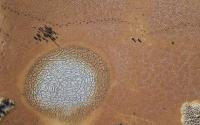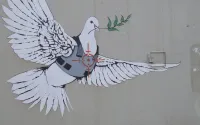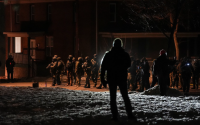14 April 2007Sabrina Tavernise
Tens of thousands of people filled the central streets of Turkey’s capital on Saturday to protest what they see as an increasingly Islamic tint to their government.
A presidential election is approaching in Turkey, and the protesters were voicing their opposition to the head of the leading party in Parliament, with its Islamist roots, taking the post.
“We don’t want to become another Iran, another Afghanistan,” said Hanife Sahin, a retired nurse, stooping under the red tent formed by a Turkish flag that ran like a river over the crowd.
News reports said demonstrators numbered as many as 300,000, an unexpectedly high turnout for a gathering that was initially expected to draw only harder-line nationalists. The numbers underlined the deepening divide within Turkish society over the role of Islam in Turkey, a country whose very charter scrubbed the government clean of religion.
“Believe me, all of Turkey is here,” said a 27-year-old market researcher, as teenage boys draped in Turkish flags jostled her.
But there are two Turkeys now. Turkish society is opening a lively, sometimes painful, debate on its past for the first time since 1923 when Mustafa Kemal Ataturk stamped out public religion to create the Turkish state. That has divided society and focused attention on the contest over the presidency, which controls the military and is the country’s most important post safeguarding secularism.
Officials from the ruling party, Justice and Development, known by its Turkish initials, AK, have kept their religious background away from the process of government over the four years since they were elected.
Still, the guardians of Turkish secularism have grown increasingly vocal, before the election, in accusing the ruling party of bringing their religion into politics before the election.
On Friday, the current president, Ahmet Necdet Sezer, gave his final speech before a military audience in Istanbul, warning that the country’s secular system faced its most serious danger since the founding of the state. The secular establishment Mr. Sezer represents has several times in Turkey’s short history ousted ruling parties it deemed too religious.
That sentiment was splashed on banners and spoken through loudspeakers at the protest on Saturday.
After four years in power, the party had made Turkish society more accommodating to Islamic piousness, many people said. A gaggle of high school girls ticked off the reasons they did not want the party and its leader, Recep Tayyip Erdogan, to take the presidency.
More women are wearing head scarves, said Ecem Karanfil, a 17-year-old in a T-shirt and jeans. “We want to feel comfortable dressing the way we want,” she said.
Her friend said she sensed something suspicious in the attractive new design of religion textbooks being given out in their high school. “I am wondering why,” she said, as a pretzel seller squeezed by, his wares stacked in a pyramid on his head.
A 65-year-old woman who had come from Izmir, a town in western Turkey, said she was annoyed at what she saw as the new state laxness allowing state workers to take time off for prayer on Fridays.
“I go to the post office on Friday, and I can’t see a single person at their desk,” she said, sounding indignant.
A small thing had caught Ms. Sahin’s attention. A government official had recently suggested increasing the number of letters in the Turkish alphabet to 32 to allow the language to better accommodate Arabic sounds. “I’ve done pretty well with 29 so far,” she said, smiling.






